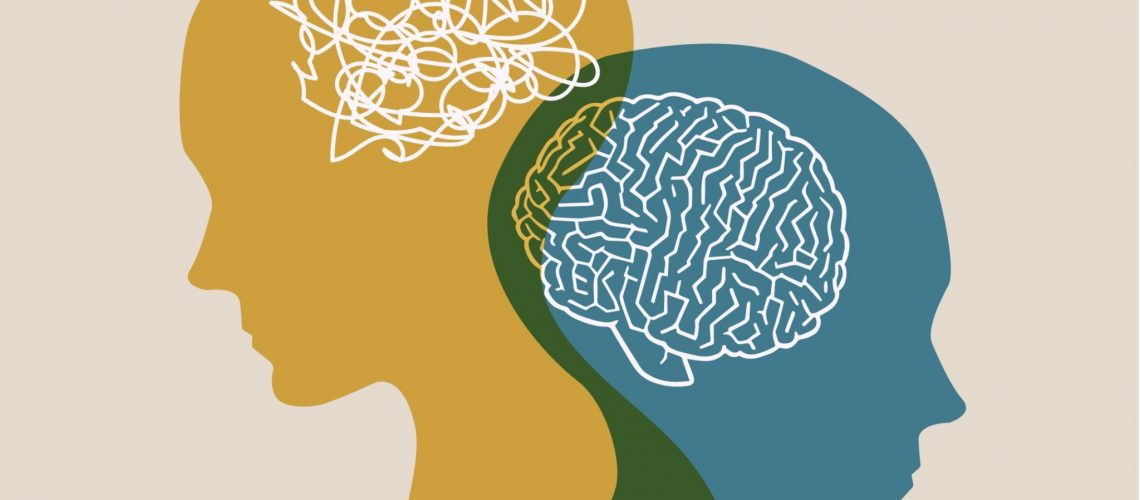When a person is struggling with both an addiction and a co-existing mental health condition, it is considered a dual diagnosis. Because each of these issues have their own challenges, overcoming both substance abuse and mental illness symptoms can be far more difficult than addressing just one of them. If the underlying issues are not addressed during drug rehab, there is a risk that the person may turn back to substance use.
Having a mental health condition alongside a drug or alcohol addiction is actually quite common. According to a 2021 survey, 9.2 million U.S. adults have had both a substance use disorder and a co-occurring mental disorder.¹
A Closer Look at Dual Diagnosis
There are many reasons why a person might have a dual diagnosis. For some, the distress caused by the mental illness has led to self-medicating with drugs or alcohol. For others, the effects of using drugs or alcohol have led to the development of a mental disorder. It is also thought that factors like genetics and trauma may play a role in the development of co-occurring conditions.
Common mental health disorders that are linked to substance abuse include:
- Anxiety
- Depression
- Bipolar disorder
- Post-traumatic stress disorder (PTSD)
- Attention-deficit/hyperactivity disorder (ADHD)
- Obsessive-compulsive disorder (OCD)
- Schizophrenia
These are common examples, but no mental health condition “counts” more than any other. Any combination of mental illness and addiction is considered a dual diagnosis.
The Cycle of Addiction and Mental Health Disorders
Dual diagnoses are complicated because the addiction and the mental illness interact and feed into one another. The mental disorder’s symptoms may be a driving factor in a person’s substance use, while the effects of drugs and alcohol can exacerbate the mental disorder’s symptoms.
Here are a few examples of how an addiction and a co-occurring disorder can interact:
- Many drugs have anxiety as a side effect, which can drive up the stress in generalized anxiety disorder, OCD, PTSD, and more.
- The “buzz” of alcohol can feel like a reprieve from depression symptoms, but as a depressant, it can make the symptoms of clinical depression This creates a cycle.
- A person who uses drugs and alcohol while taking prescribed medication for a mental health diagnosis risks harm from negative chemical interactions.
- Long-term abuse of substances can drastically change the brain, potentially triggering a new mental health condition.
- Maladaptive thought patterns and beliefs can make it harder for people to understand and comply with attempts to help them get treatment for their conditions.
Dual Diagnosis Treatment Approaches
The most effective way to address co-occurring disorders is to take a well-rounded, integrative approach. This means combining a variety of different types of therapy, activities, and medical interventions for the best overall physical and mental health.
At Del Arroyo Recovery Center, we use a combination of effective, evidence-based methodologies, including:
- Individual counseling
- Group counseling
- Cognitive behavioral therapy (CBT)
- Dialectical behavioral therapy (DBT)
- Medical detox
- Medication management
- Support group meetings
- Relapse prevention planning
- Family support
- Physical and wellness activities (meditation, yoga)
- Aftercare resources
Different people respond to treatment modalities in different ways. For the greatest success, it’s important that each individual client receives thoughtful, personalized care. Some clients feel they get the most from one-on-one therapy sessions, while others may make their best progress in a group setting. If medication is needed, it’s crucial to make sure the person receives the right prescription and dosage. There is no singular plan that works for everyone.
Challenges In Dual Diagnosis Treatment
Unsurprisingly, treating co-occurring conditions is a complex, multi-faceted task. One challenge that dual diagnosis treatment centers face is the fact that some individuals have a hard time acknowledging the reality of the diagnosis. If they have never been diagnosed with a mental disorder before, it can be difficult to accept that this plays a role in their addiction. With this kind of denial, it can be easy to slip back into using substances to “fix” the underlying condition.
Another common challenge is making sure the facility and staff have the resources and methods needed to fully address the issues properly. A holistic approach that combines different techniques and tackles every angle of a person’s well-being has a far greater likelihood of success than a program that leans too heavily on the addiction side or the psychological side. Without thorough treatment, there is a risk the person might relapse or develop new harmful behaviors.
Effective Recovery and Long-Term Success
Proper dual diagnosis treatment is powerful, with a strong history of successful recovery. Research shows that people who complete a dual diagnosis program show a 37% higher abstinence rate, an 8% reduction in mental health symptoms, and a 9% increase in employment rate compared to intake. Follow-up data also suggests that a stronger dual diagnosis focus leads to better outcomes down the line.²
Another important piece of dual diagnosis rehab is aftercare. Providing ongoing counseling, support groups and other guidance can help program graduates maintain sobriety and stability over the long term. At Del Arroyo Recovery Center, we have an alumni program that provides this kind of continuing support for our graduates.
Professional Dual Diagnosis Treatment Can Change Your Life
If you’re struggling with the effects of mental illness as well as an addiction to drugs and alcohol, dual diagnosis treatment at Del Arroyo Recovery Center can help. With professional treatment and compassionate support, we’ll help you tackle the complex issues of co-occurring disorders and learn the strategies you need to start a new life. We take a holistic, big-picture approach, providing personalized care in a beautiful Southern California environment.
It’s time to take control back from the underlying problems that have been running your life. Contact us today to learn more about our inpatient dual diagnosis treatment programs and how we can help you achieve lasting sobriety and happiness.
Sources:



